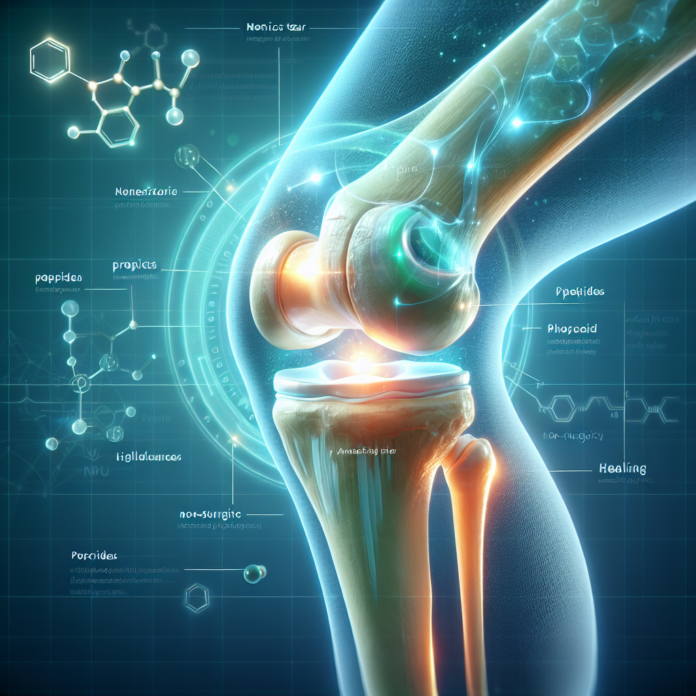When faced with a meniscus tear, the natural assumption might be that surgery is the only viable path to recovery. However, with advancements in medical science and the growing interest in less invasive treatments, peptides like BPC 157 have entered the conversation as potential alternatives. As a triple board-certified orthopedic surgeon, Sports Medicine specialist, and expert in anti-aging and regenerative medicine, I delve into the question many of you have asked: “Can BPC 157 aid in the healing of a meniscus tear?” While traditionally, these injuries have not been known to heal independently due to limited blood supply, the realm of regenerative medicine may offer some hope. In this blog, we’ll explore the role of BPC 157, consider its experimental nature as recognized by the FDA, and weigh its potential benefits against more established treatments. Whether you’re skeptical or intrigued, understanding these options could be crucial in managing your orthopedic health without resorting to surgery.
The Meniscus and Its Challenges
A torn meniscus is a common knee injury that can be particularly frustrating due to the limited self-healing capacity of the meniscal tissue. The meniscus, a C-shaped cartilage in the knee, functions as a shock absorber and stabilizer. Its location and lack of robust blood supply mean that when a tear occurs, the body’s natural ability to heal is significantly diminished.
The Complexity of Healing
The limited healing capability of the meniscus is due to several factors:
- Lack of Blood Supply: Only the outer edges of the meniscus receive sufficient blood flow necessary for healing.
- Mechanical Stress: Constant pressure and movement in the knee can inhibit the healing process.
- Type and Location of Tear: Some tears may be more amenable to healing than others, depending on their type and location.
Given these challenges, patients and practitioners alike are often on the lookout for alternatives to surgery that might promote healing.
Peptides: Hope or Hype?
Enter BPC 157, a peptide derived from the body’s own gastric juice. Peptides are chains of amino acids that can influence various biological processes. In the context of BPC 157, it’s claimed to have healing properties, which is why it has sparked interest as a potential therapeutic agent for meniscus tears.
Currently, the FDA classifies BPC 157 as experimental, meaning that its safety and efficacy are not fully established. While some anecdotal reports and preliminary research suggest potential benefits, they fall short of offering conclusive evidence.
Potential Mechanisms of BPC 157
BPC 157 is believed to:
- Enhance Cellular Repair: Some studies suggest that BPC 157 may assist in cellular repair and regeneration, promoting healing at the injury site.
- Reduce Inflammation: By potentially reducing inflammation, BPC 157 might help alleviate pain associated with knee injuries.
- Support Vascular Health: Improved vascular health could contribute to more effective nutrient delivery to the injury site, albeit indirectly.
Limitations and Skepticism
Despite these intriguing possibilities, skepticism remains, particularly regarding BPC 157’s ability to physically reach and impact the meniscus when administered orally or via injection. The intra-articular (within the joint) environment of the knee presents a significant barrier, and to date, there are no robust clinical trials demonstrating that BPC 157 or similar peptides have a substantial regenerative effect on meniscus tissue.
Alternatives and Considerations
While BPC 157 remains a topic of interest, it’s essential to explore and consider other, more established regenerative treatments:
- Platelet-Rich Plasma (PRP) Therapy: Uses components derived from one’s blood to promote healing.
- Stem Cell Therapy: Utilizes undifferentiated cells to regenerate damaged tissue.
- Physical Therapy: Essential in strengthening surrounding muscles and enhancing joint mobility to support the healing process.
Personalized Approaches to Treatment
Deciding on the right course of treatment is highly individual. It requires considering factors like the tear’s type and location, the patient’s lifestyle, and the degree of knee stability desired. Open communication with healthcare providers and exploring emerging and established therapies can be empowering for patients navigating treatment options.
Engaging with Your Health Community
Communication and learning from others in similar situations can provide valuable insights. Sharing experiences and results (non-clinical) can offer support and foster deeper understanding, even if personal anecdotes should not replace evidence-based medical advice.
To conclude, while BPC 157 presents an interesting avenue in the exploration of non-surgical treatments for meniscus tears, it should be approached with cautious optimism. Until more rigorous studies offer clear evidence of its benefits and safety, patients should weigh all available options, prioritize discussions with qualified healthcare providers, and remain informed about evolving treatment landscapes. As science progresses, we may see new, proven solutions emerge for conditions like meniscus tears, enhancing both recovery outcomes and quality of life.
